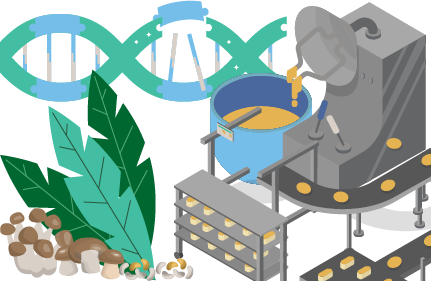Webinar on Microbial Biotechnology for Novel Food and Food Ingredients for India
-

January 11, 2022
3:00 pm - 5:30 pm(Online, Time in IST)
New Delhi, India
India has seen significant growth in its food processing industry in recent years. Rising incomes and urbanization has increased interest in convenience foods such as cereals and baked goods, and growing the value-added food processing industry could help reduce waste of perishable produce. Food ingredients are an essential part of the global food supply and international trade, and microbial fermentation is used to make purified flavors, vitamins, amino acids, and other compounds for the food industry. Producers around the world use microbe-derived products because they provide yield, purity, cost competitiveness advantages, and potential resource conservation.
Microbial biotechnology, including techniques other than genetic engineering, is one technology used to produce products of microbial fermentation. In the food industry, it is used to produce a range of foods, beverages, and their ingredients. Supported by a grant from the New Technologies and Production Methods Division at the U.S. Department of Agriculture (USDA) Foreign Agricultural Service (FAS) Trade Policy and Geographic Affairs (TPGA) area, the Agriculture & Food Systems Institute (AFSI) and Biotech Consortium India Limited (BCIL) jointly organized a webinar to convene scientists and policymakers from academia, industry, and government to discuss regulatory policies and science communication around low-risk, well-characterized food ingredients that have been derived from genetically modified microbes, algae, and fermented products. By bringing experts together to discuss science-based, transparent functional biotechnology regulations of products derived from microbial biotechnology, this event helped foster a shared understanding of the nature of these products and the proportionate risks associated with them in the context of food.
After a brief welcome and introduction by organizers, the plenary session began with a discussion of emerging trends in India’s food processing industry, followed by a presentation on the science of microbial biotechnology. The program then shifted to regulatory requirements for food ingredients and processing aids, including those derived from microbial biotechnology, before concluding with some firsthand experience of navigating the regulatory system in India. The event ended with a moderated panel discussion, providing an opportunity for participants to ask questions.

Agenda
3:00 pm
Welcome
Dr. Vibha Ahuja, Chief General Manager, BCIL
3:05 pm
Introduction
Dr. Rachel Melnick, Senior Manager – Scientific Programs, AFSI
3:10 pm
Emerging Trends in India’s Food Processing Industry
Dr. Manish Shukla, Lead – Synthetic Biology Food & Feed Ingredients, Reliance Industries
3:25 pm
Science of Microbial Biotechnology
Dr. Paul Hanlon, Director – Regulatory, Scientific & Government Affairs, Abbott Nutrition
3:45 pm
Regulatory Requirements for Food Ingredients and Processing Aids, Including Those Derived from Microbial Biotechnology
Dr. Lalitha Gowda, Former Chief Scientist, Central Food Technological Research Institute (CFTRI), Council of Scientific and Industrial Research (CSIR)
4:05 pm
Navigating the Regulatory System in India: Challenges and Experiences
Dr. Jasvir Singh, Lead – Regulatory, Scientific & Government Affairs, International Flavors and Fragrances
4:20 pm
Panel Introductions
Dr. Bhavneet Bajaj, Manager – Scientific Programs, AFSI
4:25 pm
Moderated Panel Discussion
Dr. N. Bhaskar, Advisor – Science & Standards, Food Safety and Standards Authority of India
Dr. Sridevi A. Singh, Director, Central Food Technological Research Institute (CFTRI), Mysore
Prof. Ashok Pandey, Distinguished Scientist, CSIR-Indian Institute of Toxicological Research, Lucknow
5:25 pm
Concluding Remarks
Session Descriptions
Emerging Trends India’s Food Technology Industry
Dr. Manish Shukla, Lead - Synthetic Biology Food & Feed Ingredients, Reliance Industries
 The foods processing industry is a sunrise industry in India and has had large growth in the recent years. Grocery manufacturing has a compound annual growth rate of 25%1. However, compared to other developed countries, India has a low level of processed foods exports2. The food processing industry has been highlighted as a sector that would be an opportunity for growth in the Make In India initiative. There are several Mega Food Parks recently completed and more being built across the country3 and a simplified investment procedure to attract foreign investments4. Changing lifestyles in India, such as increased income and urbanization, have led to increased interest in convenience foods such as cereals and a growing bakery sector. Additionally, growth of the value-added food industry could help to reduce the 40% of perishable produce that is wasted annually5.
The foods processing industry is a sunrise industry in India and has had large growth in the recent years. Grocery manufacturing has a compound annual growth rate of 25%1. However, compared to other developed countries, India has a low level of processed foods exports2. The food processing industry has been highlighted as a sector that would be an opportunity for growth in the Make In India initiative. There are several Mega Food Parks recently completed and more being built across the country3 and a simplified investment procedure to attract foreign investments4. Changing lifestyles in India, such as increased income and urbanization, have led to increased interest in convenience foods such as cereals and a growing bakery sector. Additionally, growth of the value-added food industry could help to reduce the 40% of perishable produce that is wasted annually5.
One component of developing value-added food is the requirement for ingredients necessary to support increased growth in the industry. One example is the requirement that all cheese be vegetarian, so only microbial derived rennet can be used. While companies are using genetically engineered microbes to produce chymosin, most companies are not using modern techniques to improve microbial strains and produce food ingredients. The Indian food enzyme market is projected to register a CAGR of 3.8% during 2020-20266. As India’s food processing sector is highlighted as a sunrise sector, this talk will focus on the opportunities the food processing and the food ingredient industry provide for India’s bioeconomy7.
1 Invest India. 2021. Food Processing – ‘A sunrise sector’
2 KPMG. May 2021 Indian food processing industry: Growth opportunities post the Covid-19 pandemic
3 GoI Ministry of Food Processing. 2021. India – Land of opportunities
4 Food Ingredients India. Key factors driving growth in the Indian food processing sector
5 USDA FAS GAIN Report. 2021. IN2021-0041: Food Processing Ingredients 1
6 https://www.mordorintelligence.com/industry-reports/india-food-enzymes-market-industry
7 USDA FAS GAIN Report.2019. IN9041: India’s Food Processing Sector-A Sunrise Sector and BIRAC’s India Bioeconomy Report 2021
Science of Microbial Biotechnology
Dr. Paul Hanlon, Director - Regulatory, Scientific & Government Affairs, Abbott Nutrition
 There is a long history of using industrial fermentation to produce a range of ingredients for food. Unlike fermented foods (e.g., yogurt), food ingredients sourced from fermentation of a single colony undergo several refinement steps to purify before use as food ingredients or food processing aids. This session will present a brief overview of the science behind how microbes are used to develop food ingredients and how genetic modified microorganisms have become widespread in the production of food ingredients and processing aids, as advanced techniques are used to improve strains and develop novel ingredients. The talk will then present a brief overview of how many countries simply look at these as purified compound used in food, so they go through the relevant food safety authority. Regulatory agencies in Canada, EU, and US evaluate the safety of the biotech microbes and the purified products derived from the microbes. The decision tree for enzymes derived from microbial biotech of Pariza & Johnson 20011 takes into account the history of safe use of the purified product and the organism by way of the safe strain lineage concept. This decision tree has informed the framework for products derived from microbial biotechnology of the US FDA and other regulatory jurisdictions2. While most regulatory agencies have alignment in how they assess the safety of products derived from microbial biotechnology, lack of consistent language non-GMO labeling and inconsistences in global regulation can serve as unnecessary trade barriers for these products3.
There is a long history of using industrial fermentation to produce a range of ingredients for food. Unlike fermented foods (e.g., yogurt), food ingredients sourced from fermentation of a single colony undergo several refinement steps to purify before use as food ingredients or food processing aids. This session will present a brief overview of the science behind how microbes are used to develop food ingredients and how genetic modified microorganisms have become widespread in the production of food ingredients and processing aids, as advanced techniques are used to improve strains and develop novel ingredients. The talk will then present a brief overview of how many countries simply look at these as purified compound used in food, so they go through the relevant food safety authority. Regulatory agencies in Canada, EU, and US evaluate the safety of the biotech microbes and the purified products derived from the microbes. The decision tree for enzymes derived from microbial biotech of Pariza & Johnson 20011 takes into account the history of safe use of the purified product and the organism by way of the safe strain lineage concept. This decision tree has informed the framework for products derived from microbial biotechnology of the US FDA and other regulatory jurisdictions2. While most regulatory agencies have alignment in how they assess the safety of products derived from microbial biotechnology, lack of consistent language non-GMO labeling and inconsistences in global regulation can serve as unnecessary trade barriers for these products3.
1 Pariza, M. W., & Johnson, E. A. (2001). Evaluating the safety of microbial enzyme preparations used in food processing: update for a new century. Regul Toxicol Pharmacol, 33(2), 173-186.
2 Sewalt, V., Shanahan, D., Gregg, L., La Marta, J., & Carrillo, R. (2016). The Generally Recognized as Safe (GRAS) Process for Industrial Microbial Enzymes. Industrial Biotechnology, 12(5), 295-302. Sewalt, V. J., Reyes, T. F., & Bui, Q. (2018). Safety evaluation of two alpha-amylase enzyme preparations derived from Bacillus licheniformis expressing an alpha-amylase gene from Cytophaga species. Regul Toxicol Pharmacol, 98, 140-150.
3 Hanlon & Sewalt (2021) GEMs: genetically engineered microorganisms and the regulatory oversight of their uses in modern food production, Critical Reviews in Food Science and Nutrition, 61:6, 959-970
Regulatory Requirements for Food Ingredients and Processing Aids, Including Those Derived from Microbial Biotechnology
Dr. Lalitha Gowda, Former Chief Scientist, Central Food Technological Research Institute (CFTRI), Council of Scientific and Industrial Research (CSIR)
 In India, the Food Safety and Standards Authority of India (FSSAI) oversees regulation of food and food ingredients. FSSAI implements and enforces food regulations as prescribed in the Food Safety and Standards Act, 2006. The GOI regulation is primarily based on Codex Alimentarius. All food ingredients undergo safety evaluation to meet the standard set by the national regulatory body. This session will cover the current regulation and pathway for approval of food ingredients in India generally, before discussing how products of microbial biotechnology, such as chymosin, have been regulated in India.
In India, the Food Safety and Standards Authority of India (FSSAI) oversees regulation of food and food ingredients. FSSAI implements and enforces food regulations as prescribed in the Food Safety and Standards Act, 2006. The GOI regulation is primarily based on Codex Alimentarius. All food ingredients undergo safety evaluation to meet the standard set by the national regulatory body. This session will cover the current regulation and pathway for approval of food ingredients in India generally, before discussing how products of microbial biotechnology, such as chymosin, have been regulated in India.
Navigating the Regulatory System in India: Challenges and Experiences
Dr. Jasvir Singh, Lead - Regulatory, Scientific & Government Affairs, International Flavors and Fragrances
 This session will present a brief firsthand experience from a company in India that has successfully gone through the regulatory process to get a product to market.
This session will present a brief firsthand experience from a company in India that has successfully gone through the regulatory process to get a product to market.
Moderated Panel Discussion
All session speakers will participate in a moderated panel discussion, joined by additional panelists listed below:
Panelists
Prof. Ashok Pandey
Distinguished Scientist, CSIR-Indian Institute of Toxicological Research, Lucknow
 Prof. Ashok Pandey is currently a Distinguished Scientist at the Centre for Innovation and Translational Research, CSIR-Indian Institute of Toxicology Research, Lucknow, India. His major research interests are in industrial/environmental biotechnology and energy biosciences. He is the author of ~1550 publications/communications, which include 16 patents, 108 books, ~850 papers and book chapters, etc., with an h index of 114 and >57,000 citations (Google scholar). Prof. Pandey is the recipient of many national and international awards and honors, which include Highly Cited Researcher (top 2% in the world), Rank no 1 in India for Microbiology, Elsevier Citation Report (2021); Highly Cited Researcher (h>100), Google Scholar Citations (2021); Highest Cited Researcher (Top 0.1% in the world), Clarivate Analytics (2018-to-date); Top scientist in Biotechnology (no. 1 in India and no. 8 in world), Stanford University World Ranking (2020, 2021), etc. He is Editor-in-Chief of Bioresource Technology (Elsevier) and advisor and editorial board member for several national and international journals.
Prof. Ashok Pandey is currently a Distinguished Scientist at the Centre for Innovation and Translational Research, CSIR-Indian Institute of Toxicology Research, Lucknow, India. His major research interests are in industrial/environmental biotechnology and energy biosciences. He is the author of ~1550 publications/communications, which include 16 patents, 108 books, ~850 papers and book chapters, etc., with an h index of 114 and >57,000 citations (Google scholar). Prof. Pandey is the recipient of many national and international awards and honors, which include Highly Cited Researcher (top 2% in the world), Rank no 1 in India for Microbiology, Elsevier Citation Report (2021); Highly Cited Researcher (h>100), Google Scholar Citations (2021); Highest Cited Researcher (Top 0.1% in the world), Clarivate Analytics (2018-to-date); Top scientist in Biotechnology (no. 1 in India and no. 8 in world), Stanford University World Ranking (2020, 2021), etc. He is Editor-in-Chief of Bioresource Technology (Elsevier) and advisor and editorial board member for several national and international journals.
Dr. Sridevi A. Singh
Director, Central Food Technological Research Institute (CFTRI), Mysore
 Dr. Sridevi A. Singh is an accomplished food technologist and active researcher. She currently serves as Director of the Central Food Technology Research Institute (CFTRI), Mysore, India, a role she assumed in January 2021. A gold medalist graduate from the University of Mysore, Dr. Singh has been a Young Scientist Fellow, Hanover, Germany (2000), INF-Kraft Fellow (2006), and participant in the Indo-Finland Exchange Program (2018). With a career spanning over three decades, she has worked extensively on both basic and applied aspects of food science and has made significant contributions towards unfolding the protein structure-function-activity relationship, proteins and enzymes as food ingredients, nutraceuticals from traditional food, and technologies for combating malnutrition. Some technologies that have been transferred to industry include: amylase rich energy food, soy protein hydrolysates, heat resistant sesame seeds, and supplementary food for Severely Malnourished Children (SAM). Over 40 entrepreneurs have taken these technologies thus far. During the XII Five-year plan period as Principal Investigator of the Wellness Food Project, an array of innovative products were brought out, targeted to every sector of the population. Further, pilot level malnutrition intervention studies were undertaken during the same period, with the participation of over 200 Anganwadi children, to assess the efficacy of supplementary foods developed by CFTRI. Dr. Singh has published over 50 manuscripts in peer reviewed journals, and she holds a total of 11 patents to her credit, including 5 US patents. She has guided 5 students through their doctoral thesis, along with over 40 post-graduate students thus far. Currently, she is focusing on alternate and unconventional sources of protein and micronutrients to combat malnutrition and the development of novel food ingredients for health benefits.
Dr. Sridevi A. Singh is an accomplished food technologist and active researcher. She currently serves as Director of the Central Food Technology Research Institute (CFTRI), Mysore, India, a role she assumed in January 2021. A gold medalist graduate from the University of Mysore, Dr. Singh has been a Young Scientist Fellow, Hanover, Germany (2000), INF-Kraft Fellow (2006), and participant in the Indo-Finland Exchange Program (2018). With a career spanning over three decades, she has worked extensively on both basic and applied aspects of food science and has made significant contributions towards unfolding the protein structure-function-activity relationship, proteins and enzymes as food ingredients, nutraceuticals from traditional food, and technologies for combating malnutrition. Some technologies that have been transferred to industry include: amylase rich energy food, soy protein hydrolysates, heat resistant sesame seeds, and supplementary food for Severely Malnourished Children (SAM). Over 40 entrepreneurs have taken these technologies thus far. During the XII Five-year plan period as Principal Investigator of the Wellness Food Project, an array of innovative products were brought out, targeted to every sector of the population. Further, pilot level malnutrition intervention studies were undertaken during the same period, with the participation of over 200 Anganwadi children, to assess the efficacy of supplementary foods developed by CFTRI. Dr. Singh has published over 50 manuscripts in peer reviewed journals, and she holds a total of 11 patents to her credit, including 5 US patents. She has guided 5 students through their doctoral thesis, along with over 40 post-graduate students thus far. Currently, she is focusing on alternate and unconventional sources of protein and micronutrients to combat malnutrition and the development of novel food ingredients for health benefits.



